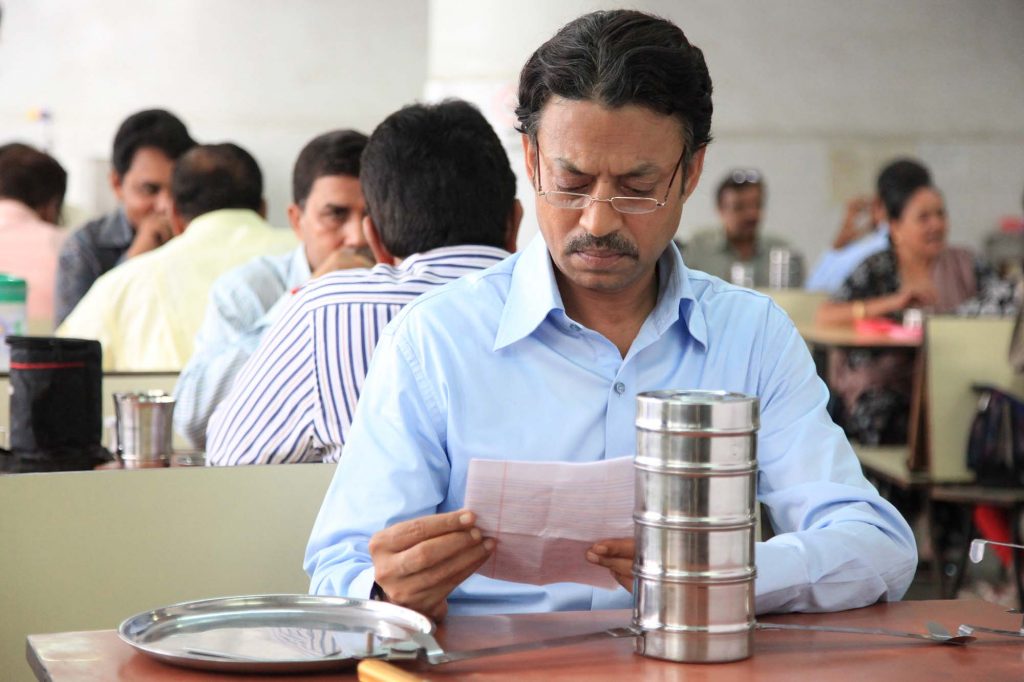It’s much more difficult to write a review of a good film as compared to reviewing a trashy one. Even more so in our cinema, where a good film is a rarity. To top it, there’s already enough that’s been written, said and discussed about this heart-warming film, both Nationally and Internationally, especially after it premiered at Cannes and garnered major accolades at the Telluride and Toronto Film Fests. Still, duty is duty, but in a nutshell, I have to say The Lunchbox is an extremely assured directorial debut by Ritesh Batra. It is a film that is charming, genteel, smile-inducing yet poignant and thought-provoking as two people – a senior accountant in an insurance company about to retire (Irrfan Khan), and a middle-class housewife (Nimrat Kaur) – connect over a dabba (lunchbox) that is delivered mistakenly to the wrong person.
First off itself, I admit the entire film itself does rest on a premise and an error that is highly, highly improbable – one that that is likely to occur only once in millions. Yes, you might even raise further questions that doesn’t Ila’s husband not recognize his own tiffin and its cover as this mix-up happens repeatedly. But then, this is not a film about the dabbawalas and their modus operandi. Rather what it shows is how the dabba acts as a catalyst between two lonely people to connect and helps to liberate them from the mechanical life they have been sucked into as happens with most cities. The film while being universal is yet undeniably so ‘Bombay’ with some great use of real locations. And that is also one of its biggest strengths.
Batra creates a world of the past for his protagonists, but one that is passing them by. It is somewhat of a time warp, a world without computers, mobiles and the internet – he even highlights this in dialogues such as when Ila tells Fernandes about how her (unseen) neighbour still listens to songs only on audio tapes and the music we hear being played is popular Hindi film music from the 1990s. Or Shaikh remarking on exchanging of letters in today’s times being odd in a world of mobiles and text messages. However, this is no golden-past-sort-of-nostalgic world that we yearn for, but one with all the realities of claustrophobic day-to-day modern urban living that effectively reflects the lives of its characters, seen with much empathy and compassion.
Martin Scorsese has famously said, “Cinema is a matter of what’s in the frame and what’s out.” Batra creates his world with just not what we see but what we hear beyond the boundaries of the frame as well. Ila’s reaction on hearing about her father’s death is done deftly off-screen, while the treatment of the neighbor above, never seen just heard is a master-stroke. Yet there is enough in her dialogue, her manner of speaking it that we never think of her as anything but a full flesh and blood character. Hats off to actress Bharati Achrekar here!
In fact, the main characters – who in the course of film try to fill the void in their lives in their own ways – are etched out beautifully and with subtlety, their developing graphs and changes done ever so gently. Fernandes is a lonely, grouchy man, yet is soft and understated. We see this even in scenes where he admonishes the children for playing outside his bungalow or in the manner of his initial quiet disregard for Shaikh. Irrfan Khan brings Fernandes to life beautifully and proves (again!) that he is undoubtedly one of the finest actors we have today, speaking volumes with his silences and his eyes. Every gesture, however small, is beautifully brought out and he is the life of the film. Nimrat Kaur is the perfect ‘other’ as Ila, the lonely middle-class housewife whose marriage (and life) is not just stagnating but going downhill. This is actually a more challenging role in that her scenes are mostly restricted to just her being alone in her flat. And Nimrat carries these on her shoulders expertly. Clearly, she is an actress to look out for. Nawazuddin as the initially boisterous and irritating trainee but one with a heart is spot on and the bond created between him and Fernandes is moving to say the least. However, You do feel Ila’s husband could have been fleshed out more, while the track with her mother doesn’t play out as well as the rest of the film, even if well-written. If I remember right, this is only the second time in an Indian film that I’ve seen, where the wife expresses practical relief at her husband’s death after Leela Chitnis in Phir Subah Hogi (1958).
Leave alone the smart writing and the brilliant acting of its principals, the film is crafted and put together meticulously as well. Batra keeps it simple yet effective – just the voice overs of Ila or Fernandes over the letters and cutting to what the letters are talking about. Special mention has to be made of not just the staging of scenes but even the transitions between scenes, the use of the Pardesi song and the Sajan song between the train and Ila’s house (actually auntie’s as she is playing them) or the fan to fan cut just to name same. On the technical side, all departments complement the look, feel and style of the film perfectly.
Finally, forget the Oscar selection controversy. And in any case I cannot comment on it as I haven’t seen The Good Road, but what I can say is – The Lunchbox is certainly rewarding viewing. Highly recommended, go for this one!
Hindi, Drama, Color


